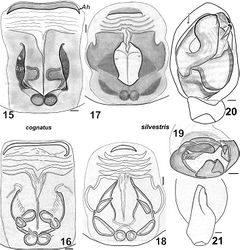Haplodrassus cognatus
| Notice: | This page is derived from the original publication listed below, whose author(s) should always be credited. Further contributors may edit and improve the content of this page and, consequently, need to be credited as well (see page history). Any assessment of factual correctness requires a careful review of the original article as well as of subsequent contributions.
If you are uncertain whether your planned contribution is correct or not, we suggest that you use the associated discussion page instead of editing the page directly. This page should be cited as follows (rationale):
Citation formats to copy and paste
BibTeX: @article{Kovblyuk2012ZooKeys205, RIS/ Endnote: TY - JOUR Wikipedia/ Citizendium: <ref name="Kovblyuk2012ZooKeys205">{{Citation See also the citation download page at the journal. |
Ordo: Araneae
Familia: Gnaphosidae
Genus: Haplodrassus
Name
Haplodrassus cognatus (Westring, 1861) – Wikispecies link – ZooBank link – Pensoft Profile
- Haplodrassus cognatus: Tullgren 1946[1]: 106, f. 31C, pl. 17, f. 221–224 (♂♀).
- Haplodrassus cognatus: Miller and Buchar 1977[2]: 168, pl. III, f. 8–10 (♂♀).
- Haplodrassus cognatus: Grimm 1985[3]: 134, f. 155, 168–169 (♂♀).
- Haplodrassus cognatus: Roberts 1998[4]: 109, f. (♂♀).
- Haplodrassus cognatus: Almquist 2006[5]: 407, f. 351a–f (♂♀).
- Haplodrassus cognatus: Kamura 2007[6]: 97, f. 7–8 (♂).
- Haplodrassus cognatus: Kamura 2009[7]: 485, f. 32–34 (♂♀). For a complete list of references see Platnick (2012)[8].
Records from Crimea
Bragina (1984)[9]; Kovblyuk (2004a[10],b[11], 2006[12]); Kovblyuk et al. (2008)[13].
Note
The earlier record of Haplodrassus cognatus from Crimea was based on specimens of unknown sex and number from Karadag Nature Reserve (Bragina 1984[9]). Haplodrassus cognatus is absent in our material from Crimea, although we have large collections, especially from the Karadag Reserve). It is reasonable to conclude that the earlier records of Haplodrassus cognatus from Crimea represent a misidentified material.
Additional material
UKRAINE. Donetsk Area: 1 ♀ (TNU), Slavyansky Distr., Svyatogorsk Town, N49°02', E37°39', Quercus, 7.06–9.07.2005, N.Yu. Polchaninova.
Comparative material
Haplodrassus silvestris (Blackwall, 1833): UKRAINE. Chernovtsy Area: 1 ♂ (TNU № 2153), Tsetsyno Town, Fagus wood, 23.04–18.05.2009, V.V. Garashchuk & T.O. Auzyak. Kharkiv Area: 1 ♂, 1 ♀ (TNU), Veliko-Burlukskiy Distr., Nesterivka Vill., N49°53', E37°17', 14.06–14.07.2003, N.Yu. Polchaninova. RUSSIA. Belgorod Area: 1 ♀ (TNU), Borisobsky Distr., Borisovka Town, “Les na Vorkle” Reserve, N50°38', E35°58', 5.07.unknown year, N.Yu. Polchaninova.
Diagnosis
Haplodrassus cognatus can be distinguished from all other Haplodrassus species by its straight terminal apophysis with a basal tooth in males, and by the shape of the fovea and wide anterior hood (Ah) in females.
Distribution
It has a trans-Palearctic boreo-nemoral range and occurs from France to Hokkaido, north to north Ural and Tomsk, and south to Greece (Marusik et al. 2000[14]; Helsdingen 2010[15]; Platnick 2012[8]).
Phenology
In Central Europe ♂♀ – III-X (Nentwig et al. 2011[16]).
Taxon Treatment
- Kovblyuk, M; Kastrygina, Z; Omelko, M; 2012: A review of the spider genus Haplodrassus Chamberlin, 1922 in Crimea (Ukraine) and adjacent areas (Araneae, Gnaphosidae) ZooKeys, 205: 59-89. doi
Other References
- ↑ Tullgren A (1946) Svenska spindelfauna: 3. Egentliga spindlar. Araneae. Fam. 5–7. Clubionidae, Zoridae och Gnaphosidae. Entomologiska Foreningen, Stockholm, 141 pp.
- ↑ Miller F, Buchar J (1977) Neue spinnenarten aus der gattung Zelotes Distel und Haplodrassus Chamberlin (Araneae, Gnaphosidae). Acta Universitatis Carolinae – Biologica 6: 157-171.
- ↑ Grimm U (1985) Die Gnaphosidae Mitteleuropas (Arachnida, Aranei). Verlag Paul Parey, Hamburg and Berlin, 318 pp.
- ↑ Roberts M (1998) Spinnengids. Tirion, Baarn, 397 pp.
- ↑ Almquist S (2006) Swedish Araneae, part 2 – families Dictynidae to Salticidae. Insect Systematics and Evolution 63: 285-601.
- ↑ Kamura T (2007) Spiders of the genus Haplodrassus (Araneae: Gnaphosidae) from Japan. Acta Arachnologica 55 (2): 95-103. doi: 10.2476/asjaa.55.95
- ↑ Kamura T (2009) Trochanteriidae, Gnaphosidae, Prodidomidae, Corinnidae. In: Ono H (Ed). The Spiders of Japan with keys to the families and genera and illustrations of the species. Tokai University Press, Kanagawa, 482–500: 551-557. [in Japanese]
- ↑ 8.0 8.1 Platnick N (2012) Gnaphosidae_The World Spider Catalog, Version 12.5 (Fam. Gnaphosidae Pocock, 1898) http://research.amnh.org/entomology/spiders/catalog/GNAPHOSIDAE.html
- ↑ 9.0 9.1 Bragina V (1984) Spiders fauna of Karadagh. In: Letopis’ prirody. T.1. Kniga.1. Institut biologii yuzhnykh morei im. A.O. Kovalevskogo. Karadagskoe otdelenie. Karadagskyi gosudarstvennyi zapovednik AN USSR, 64–68. [in Russian]
- ↑ Kovblyuk N (2004a) Catalogue of the spiders (Arachnida, Aranei) of the Crimea. Voprosy razvitiya Kryma. Nauchno-prakticheskiy i discussionno-analiticheskiy sbornik. Problemy inventarizatsii krymskoi bioty 15: 211-262. [in Russian]
- ↑ Kovblyuk M (2004b) Preliminary results of spiders fauna and biotopic distribution of spiders in Karadag Nature Reserve study. National Academy of Sciences of Ukraine. Karadag Nature Reserve. Annals 20: 139-145. [in Russian]
- ↑ Kovblyuk M (2006) Gnaphosid spiders (Arachnida: Aranei) in Crimean fauna. Abstract of PhD thesis, Kyiv, Ukraine: Institute of Zoology Ukrainian Academy of Sciences. 22 p. [in Ukrainian]
- ↑ Kovblyuk M, Kukushkin O, Gnelitsa V, Nadolny A (2008) Brief atlas of spiders (Arachnida, Aranei) of Karadag Nature Reserve. N.Orianda, Simpheropol, 120 pp.[in Russian]
- ↑ Marusik Y, Logunov D, Koponen S (2000) Spiders of Tuva, South Siberia. IBPN FEB RAS, Magadan, 252 pp.
- ↑ Helsdingen P (2010) Fauna Europaea: Araneae. Database. Version 2.2 [www.european-arachnology.org www.european-arachnology.org]
- ↑ Nentwig W, Blick T, Gloor D, Hänggi A, Kropf C (2011) Spiders of Europe. [www.araneae.unibe.ch www.araneae.unibe.ch]
Images
|
